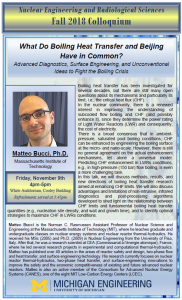Presented By: Nuclear Engineering & Radiological Sciences
NERS Colloquium: Matteo Bucci, Ph.D
What Do Boiling Heat Transfer and Beijing Have in Common?

Matteo Bucci, Ph.D., Massachusetts Institute of Technology
Boiling heat transfer has been investigated for several decades, but there are still many open questions about its mechanisms and particularly its limit, i.e., the critical heat flux (CHF). In the nuclear community, there is a renewed interest in improving the understanding of subcooled flow boiling and CHF (and possibly enhance it), since they determine the power rating of Light Water Reactors (LWR) and consequently, the cost of electricity. There is a broad consensus that in ambient-pressure, saturated pool boiling conditions, CHF can be enhanced by engineering the boiling surface at the micro- and nano-scale. However, there is still no general agreement on the actual enhancement mechanisms, let alone a universal model. Predicting CHF enhancement in LWRs conditions, e.g., in high-pressure (150 bar) flow boiling, is even a more challenging task. In this talk, we will discuss methods, results, and new directions of boiling heat transfer research aimed at enhancing CHF limits. We will also discuss advantages and limitations of non-intrusive, infrared diagnostics and post-processing algorithms developed to shed light on the relationship between CHF limits and fundamental boiling heat transfer quantities (e.g., nucleation site density, and wait and growth time), and to identify optimal strategies to maximize CHF in LWRs conditions.
Matteo Bucci is the Norman C. Rasmussen Assistant Professor of Nuclear Science and Engineering at the Massachusetts Institute of Technology (MIT), where he teaches graduate and undergraduate classes on nuclear energy systems and nuclear reactor thermal-hydraulics. He received his MSc (2005) and Ph.D. (2009) in Nuclear Engineering from the University of Pisa, Italy. After that, he was a research scientist at CEA (Commissariat à l’énergie atomique), France, where he led several research projects in experimental and computational thermal-hydraulics. Matteo has published over 40 articles in the areas of reactor safety and design, two-phase flow and heat transfer, and surface engineering technology. His research currently focuses on nuclear reactor thermal-hydraulics, two-phase heat transfer, and surface-engineering innovations to improve the safety and the economic competitiveness of existing and future advanced nuclear reactors. Matteo is also an active member of the Consortium for Advanced Nuclear Energy Systems (CANES), one of the eight MIT Low-Carbon Energy Centers (LCEC).
Boiling heat transfer has been investigated for several decades, but there are still many open questions about its mechanisms and particularly its limit, i.e., the critical heat flux (CHF). In the nuclear community, there is a renewed interest in improving the understanding of subcooled flow boiling and CHF (and possibly enhance it), since they determine the power rating of Light Water Reactors (LWR) and consequently, the cost of electricity. There is a broad consensus that in ambient-pressure, saturated pool boiling conditions, CHF can be enhanced by engineering the boiling surface at the micro- and nano-scale. However, there is still no general agreement on the actual enhancement mechanisms, let alone a universal model. Predicting CHF enhancement in LWRs conditions, e.g., in high-pressure (150 bar) flow boiling, is even a more challenging task. In this talk, we will discuss methods, results, and new directions of boiling heat transfer research aimed at enhancing CHF limits. We will also discuss advantages and limitations of non-intrusive, infrared diagnostics and post-processing algorithms developed to shed light on the relationship between CHF limits and fundamental boiling heat transfer quantities (e.g., nucleation site density, and wait and growth time), and to identify optimal strategies to maximize CHF in LWRs conditions.
Matteo Bucci is the Norman C. Rasmussen Assistant Professor of Nuclear Science and Engineering at the Massachusetts Institute of Technology (MIT), where he teaches graduate and undergraduate classes on nuclear energy systems and nuclear reactor thermal-hydraulics. He received his MSc (2005) and Ph.D. (2009) in Nuclear Engineering from the University of Pisa, Italy. After that, he was a research scientist at CEA (Commissariat à l’énergie atomique), France, where he led several research projects in experimental and computational thermal-hydraulics. Matteo has published over 40 articles in the areas of reactor safety and design, two-phase flow and heat transfer, and surface engineering technology. His research currently focuses on nuclear reactor thermal-hydraulics, two-phase heat transfer, and surface-engineering innovations to improve the safety and the economic competitiveness of existing and future advanced nuclear reactors. Matteo is also an active member of the Consortium for Advanced Nuclear Energy Systems (CANES), one of the eight MIT Low-Carbon Energy Centers (LCEC).